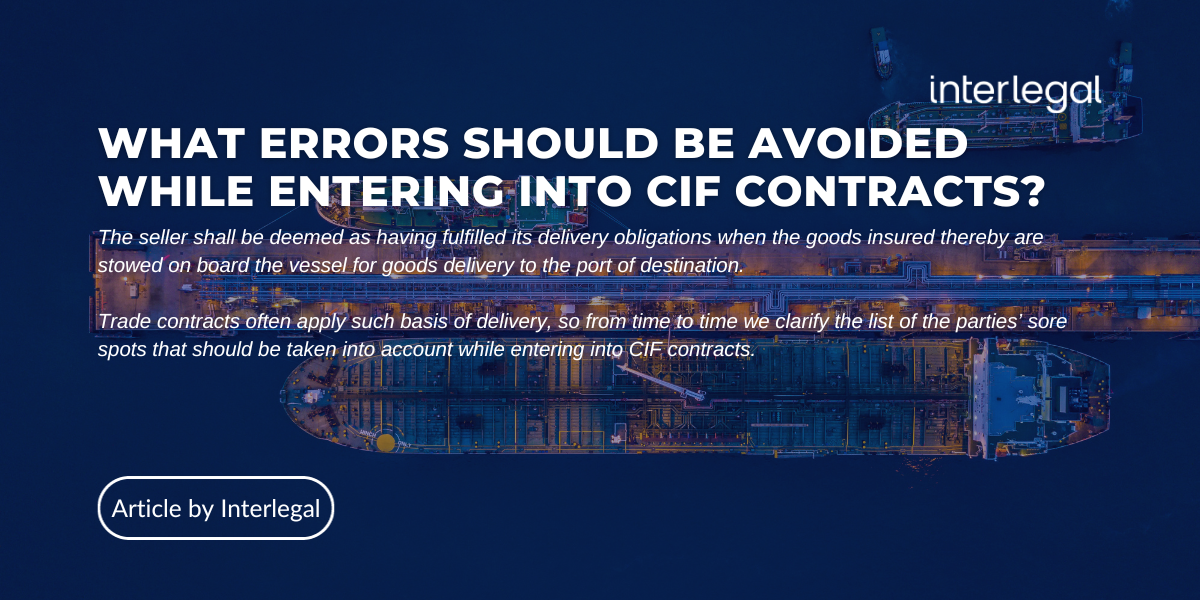Liens on cargo: the nuances of Ukrainian law
20 November, 2013
2
The right of a shipowner to declare a lien on cargo is inherent to sea carriage contracts. However, when exercising this right in Ukraine, shipowners should be aware of several nuances related to the peculiarities of the Ukrainian jurisdiction.
Ukraine recognises the concept of a lien on cargo; nonetheless, certain aspects of national legislation should be considered carefully before actually exercising this right. As a general rule, the Civil Code provides that a creditor in legitimate possession of the res (ie, the thing to be handed over to the debtor or a person specified by the debtor) is entitled to withhold the res in the event of the debtor\’s failure to fulfil its obligation to pay for it or reimburse the creditor for costs and other losses related to it. The right of possessory lien arises directly from the law and requires no additional stipulation in the contract between the creditor and the debtor.
However, an ambiguous situation may arise where a voyage charter is concluded for several consecutive voyages and the amounts go unpaid by the charterers in one of the previous voyages, while the shipowner purports to exercise its right of lien during a subsequent voyage.
Article 163 of the Merchant Shipping Code provides that:
“1. During reception of the cargo the consignee shall reimburse the expenses incurred by carrier
at the account of cargo, shall pay a fee for a vessel idle stay in the port of discharging, and pay
the freight and demurrage at the port of loading, if this is provided in the bill of lading or other
document under which the cargo had been carried…
2. The carrier may not release the cargo until the payment of sums or provision of security referred to in the first paragraph of this article.”
Further, Article 164 of the code stipulates: “To secure the demands referred to in the first paragraph of Article 163 of this Code, the carrier shall be entitled to lien on the cargo being carried.”
These provisions may be interpreted literally as meaning that the right of possessory lien can be exercised only to secure amounts unpaid and due in the current voyage, and does not extend to amounts unpaid in previous voyages.
A counter-argument to this interpretation is that the general provisions of Ukrainian civil law may be applied, under which the right of possessory lien can be executed where the debtor has not only one, but several obligations to the creditor. In other words, if the creditor possesses the res connected to one of the debtor\’s particular obligations and the debtor fails to perform its other obligations to the creditor, the creditor may execute the possessory lien in relation to these other obligations. From this perspective, in order to justify their possessory lien, shipowners may apply the general rules of civil law instead of the special provisions of the Merchant Shipping Code.
Another controversial aspect of the execution of a lien on cargo may arise where a debtor charterer is not the owner of the cargo, which is typical in shipping. The bill of lading may not associate the charterer with the cargo in any way.
Under Ukrainian civil law theory, the creditor has the right of possessory lien on the res, regardless of a third party\’s acquisition of the title to it, where the title was transferred after the res was delivered to the creditor (eg, where the negotiable bill of lading is transferred to a third party while the cargo is in transit). However, if the res did not originally belong to the debtor as its owner or bona fide holder, it cannot be withheld by the creditor.
Thus, when a shipowner exercises a lien on cargo that is not directly associated with the charterer, there is the risk that the shipowner will encounter certain legal actions from the cargo owner or consignee. Having not obtained delivery of the cargo, the cargo owner or consignee (ie, the consignee under the bill of lading or the bearer of the bill of lading) may demand delivery by applying to the courts with the possessory claim, stating that the shipowner is preventing it from taking possession and disposing of its property. The cargo owner or consignee would then request the court to compel the shipowner to discharge the cargo. In a recent case, the cargo owner even imposed an arrest on its own cargo in the vessel\’s holds in order to prevent the vessel from sailing. Combined with the lien on cargo declared by the shipowner, this created an effective deadlock.
However, there have been instances in which shipowners obtain judicial attachment to the cargo even after discharge, as an alternative to exercising the right of lien when the vessel is on roads.
The best plan of action in these situations depends on the measures chosen, which should be considered in close detail. Before declaring a lien on cargo, all possible risks for the shipowner must be duly estimated and competent legal advice should be obtained.
Andrey Perepelitsa for www.internationallawoffice.com
























































